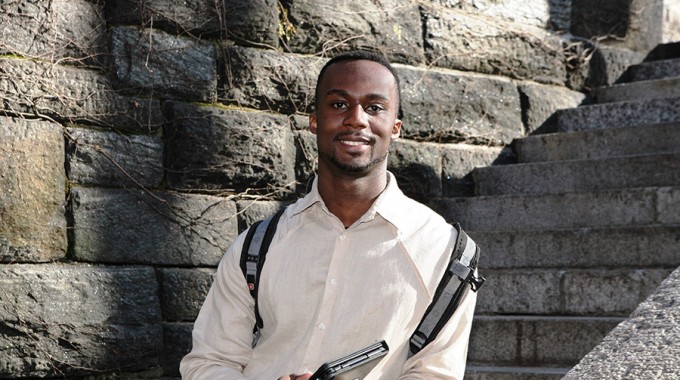Shortly after a Columbia admissions officer visited Ebe Ouattara CC’15’s high school in Abidjan, Ivory Coast, in 2010 and encouraged the then-aspiring aeronautical engineer to apply to Engineering, a violent power struggle broke out in the West African country for the second time in 10 years. Ouattara’s senior year was disrupted and, with banks and agencies closed, he had a hard time gathering documents for college applications. “It was really difficult to think about college at the time,” says Ouattara. “I wasn’t sure I was going anywhere.”
The turmoil prompted a shift in Ouattara’s goals. He’d once envisioned returning to the Ivory Coast, degree in hand, and exploring ways to make commercial flights within Africa more affordable. But that dream, he realized, required political stability. “I started to think, ‘Am I going to be able to do that if my country is fighting?’” says Ouattara. Seeing the value of majoring in political science, the SEAS admit transferred to the College before his first year even began.
Ouattara, who dreams of an Ivory Coast where “youth play a more constructive role in politics, economics and society,” credits his College education with affording him a more critical understanding of the country’s problems. “Coming to Columbia has given me the opportunity to look at things from international and regional perspectives, and to understand why different actors in the crisis made certain decisions,” says Ouattara, who lists “Democratization and Regime Change in Developing Countries” with assistant professor Kimuli Kasara and “The Evolution of Civil War Mediation Strategy” with SIPA lecturer Thomas Hill among the courses that have most influenced him.
Born in Alabama, Ouattara was 9 months old when he moved to his parents’ native Ivory Coast. His father passed away when he was 6, and he moved back to Alabama with his mother in 2003, when he was 10, at the beginning of the first Ivorian Civil War. The fighting had ended by the time they returned to Abidjan in 2007 and the situation remained stable until the post-electoral crisis that rattled the country from November 2010 to April 2011. Ouattara remembers that period as one of “fear and uncertainty”; it was unclear from one day to the next whether staples like bread or cooking gas would be available.
Empowered by a College education that has given him new perspectives, Outtara wants to do the same for other Ivorian youth by “creating a platform within the next 10 years that enables students to think critically about the information they are getting.” Looking to turn that vision into an actionable plan, he has deferred admission to the master’s program in peace and conflict studies at the University of Manchester to spend a year at home; he hopes to find work during that time with an organization that promotes post-conflict development and make connections with youth leaders. “The coming year will help me determine which avenue I believe is more effective,” he says.
Nathalie Alonso CC’08, from Queens, is a freelance journalist and an editorial producer for LasMayores.com, Major League Baseball’s official Spanish language website. She writes “Student Spotlight” for CCT.
This article was originally published in Columbia College Today.
